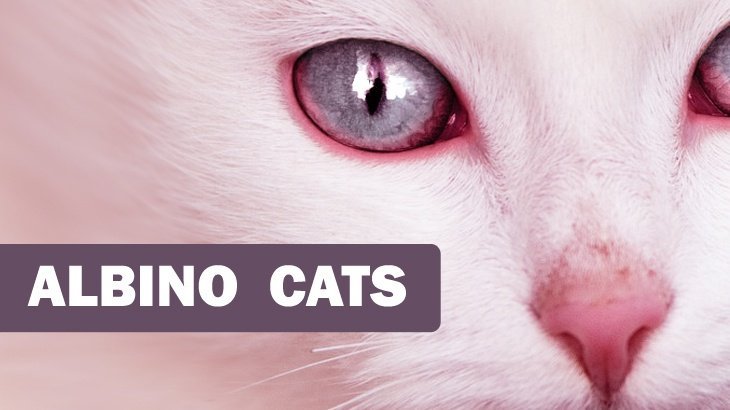The famous Oriental Shorthair cat is the most colorful kitty in the world. Its diverse pigmentation comes in at over 300 different patterns and colors!
However, there are cats that, just like humans and some dogs, have no pigmentation.
These are albino cats…they have “albinism.”
What Is An Albino Cat?
A true albino feline either completely lacks the TYR gene responsible for melanin production, or its TYR gene is somehow damaged. Such kitties are born to two albino parents because the gene is recessive, meaning both of the cat’s parents need to have the same TYR deficiency.
Feline albinism affects approximately 2% of the feline population, making true albino cats exceptionally rare.
What Are The Differences Between White And Albino Cats And Kittens?
Albino cats shouldn’t be mistaken for standard white kitties. While purely white cats are beautiful and exotic, albinos are born spotless and colorless, and they remain so throughout their lives.
White cats don’t lack the TYR gene. In fact, several cat breeds produce purely white kittens, which develop their spots and patterns later in life. White cats further differ from albinos in several fundamental aspects:
- Genetic heritage
- Eye color
- Skin and fur pigmentation
- Health concerns
White cats still produce melanin, unlike real albino kitties. For example, white cats can have colorful eyes, and their irises can be green, blue, almond, or heterochromatic.
Albinos, on the other hand, have almost transparent eyes. They usually appear pinkish-blue due to the fact that you can see the blood vessels in their eyes. Their irises lack pigmentation, unlike the irises of a typical white cat.
And while white cats can have colorful noses, albinos usually have pinkish noses and pinkish inner ears. What you’re seeing isn’t pink pigmentation – it’s blood vessels.
Similarly, albino kitties lack all pigmentation on their fur and skin. That’s one of several reasons why albino cats are far more prone to suffering from health issues than typical white felines.
Facts And Health Problems In Albino Cats
Not only are albino cats extremely rare and, as such, expensive, but their healthcare also doesn’t come cheap. These furry pals are definitely unique, and their individuality comes with a hefty price tag.
Albino cats can easily get sunburned after too much exposure to direct sunlight. Their skin is lighter and more vulnerable than a standard white cat’s.
Another issue is that they are more likely to get skin cancer.
Moreover, their eyes are extremely sensitive. They may become blind at an early age. If they don’t, their eyesight can worsen at any given moment.
Myth Buster: There is a common belief that albino cats are more prone to deafness. However, that belief is not based in science. There ARE, however, genes that cause some blue-eyed white cats (again, not to be confused with albinos) to be more prone to deafness. Therefore, it's not hard to see how this myth is propagated, since people often confuse albino cats with white-furred cats.
With these health issues, it is easy to see that albinos require special care and can’t be treated like an average feline pet.
High-quality cat food, regular eyesight and hearing check-ups, sunblock, and other skin and fur-care products are essential for the albino cat’s well-being.
As if all of the above isn’t alarming enough, if the albino kitty belongs to a feline breed that is more prone to developing certain health issues, it will be much more fragile than the rest of the kitties from that given breed!
Should You Get An Albino Cat?
Albinos are a rarity. Unfortunately, they do require abnormal efforts when it comes to caring for them.
There’s no denying that albino cats are unique and striking in terms of physical appearance. You won’t easily find them at your local cat shelter or pet store. If you do manage to find a reputable breeder or seller, don’t just jump headfirst into purchasing an albino cat.
Chances are, the kitty will develop a variety of health-related problems. And caring for a sick kitty or losing it is the worst feeling ever. The better choice is to opt for an overall healthy feline breed.
However, if you’re 100% certain you want an albino cat for a pet, do extensive research, get the best possible veterinarian, and make your cat’s well-being your number one priority.


My albino Kitty is 5 years old I got her at the animal shelter she mainly goes out at night I love her I didn’t know they were so rare.